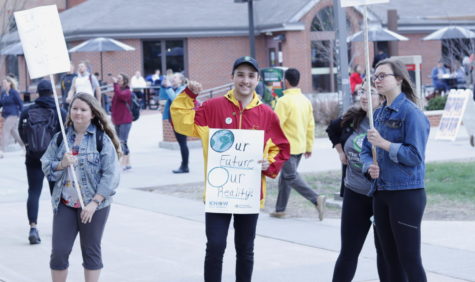Poddala Jayantha shares his story, encourages students to continue investigating
April 13, 2011
He has deep brown eyes, a thick black beard and dark skin flecked with white blotches caused by acid when it is poured on human skin. He sat up in his chair and spoke softly in Sinhalese that was, in turn, interpreted by his colleague, Sanath de Silva.
His name is Poddala Jayantha. He is a Sri Lankan journalist who was tortured, beaten and nearly killed because he spoke against his government and claimed to be fighting for freedom of expression and human rights.
He sat down with the Iowa State Daily following his lecture for a brief question and answer session.
Why did you become an investigative journalist?
“He became an investigative journalist because he realized that there were abuses and you know there was corruption,” Silva said. “There were huge amounts of public funds being wasted, pilfered away. So he thought that if he stopped it, a little bit of that would trickle down to the public, which would help the poor people, the needy people.”
Were you worried about the potential repercussions of being an investigative reporter?
“Before 2005, Sri Lanka and journalists never went through these sort of problems. There were restrictions — but not to this level, not to this degree.”
What sort of censorship have you experienced in your career?
“For him, it was a unique situation. His first job was with a government media institution, so when he discovered certain wrongdoings, he had to butt heads with the editors who were not willing to publish that because they were government media. It certainly encouraged him and gave him much inspiration so that someday he could get to the other side and investigate further.”
What was the biggest challenge you encountered as a journalist?
“He had two problems. As an investigative journalist, when he was doing that, when he was revealing those secrets he had death threats from the culprits. Then the second one was that he was fighting for the freedom of the media. Then he had threats from the government. Those were the challenges he never overcame, but he tried to beat them.”
What was the content of your most controversial stories?
“Totally political.”
How would you compare media and free speech in Sri Lanka to that in America?
“Last time when it snowed in New York, the headline in one of the papers was ‘Mayor, go home.’ Something like that is unmentionable in a country like Sri Lanka. He would have been killed had he done that. [Jayantha] felt so sad about the situation in Sri Lanka, you know. He said it’s so frustrating, even if you are there you can’t do much. At least by being here he can at least enlighten the rest of the world.”
Is it worth it?
“He says that everything he has done has not been fruitful, but he says that the ones he has revealed and the change that he has initiated he thinks that’s enough for him.”
You spoke of your attack in 2009. Why do you think you were attacked?
“He published the article and just went into hiding. He knew there were threats and he was used to that sort of threats. But the actual threat, for this one, came when he was fighting for the rights of the media. When he was fighting for the rights of the media against the government, only then did the real thing happen. Then he was abducted.”
How do you feel now that you’ve been forced to live in exile for fear of being killed?
“Some of my colleagues are still there and they have to bear the brunt of the burden. In those days, I used to be part of it. I used to share. I’m sad, but the only consolation is that my family and my daughter are safe.”
What do you hope to see in the future?
“He’s waiting for things to change before he goes back. We have a huge responsibility back home, all of us. The people are going through untold miseries there. There’s no short answer, and there’s no shortcut, but we have to have a democracy, a transparent democracy.”
“[Sri Lanka] is not a democracy now. Even our constitution enshrines all these fundamental rights, but it could be stretched, twisted to suit them because we have a poor situation, so we have to change the system. We need to have an absolute democracy where people can ask for accountability.”
Jayantha currently lives in political asylum in New York City where he works as a human rights activist attempting to raise awareness of the situation in Sri Lanka. He encouraged students to read about Sri Lanka, “fall in love with it” and to keep investigating; to learn the truth.
















